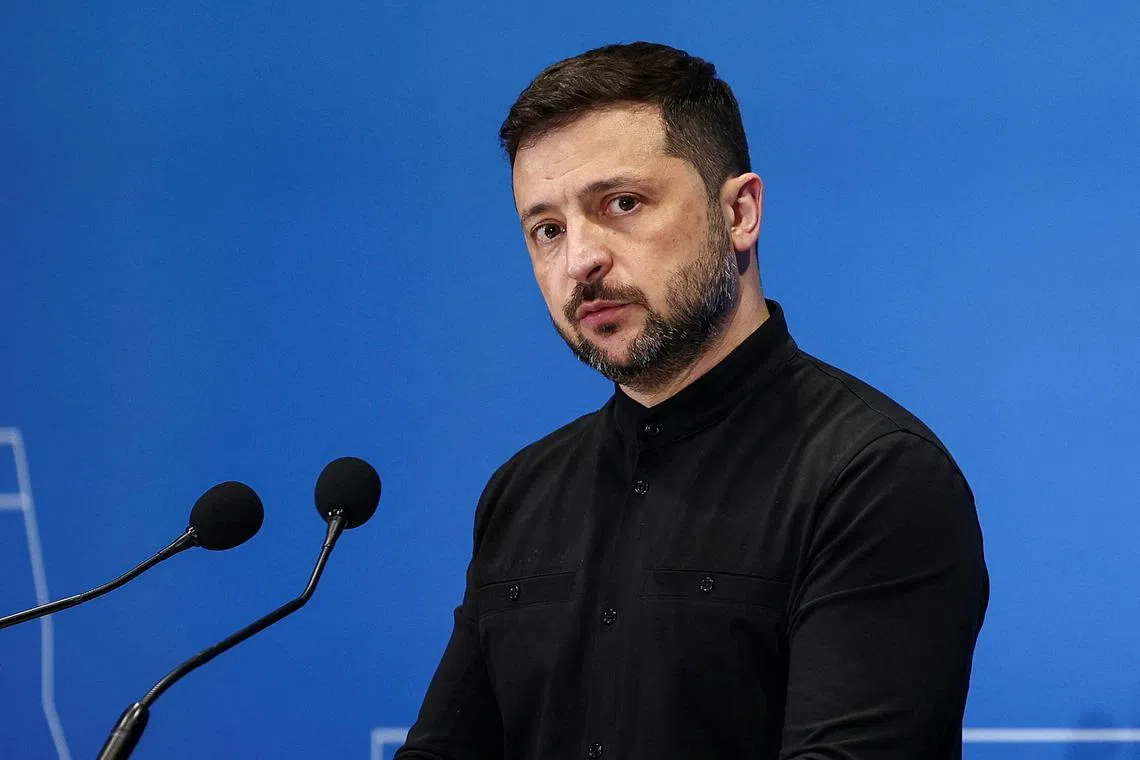Ukraine’s Zelensky approves Bill draft ‘preserving independence’ of anti-corruption bodies
Sign up now: Get ST's newsletters delivered to your inbox

Ukrainian President Volodymyr Zelensky said the text of the new Bill was “well-balanced”.
PHOTO: REUTERS
Follow topic:
- Zelensky approved draft legislation to restore anti-corruption agency independence after public criticism of earlier measures.
- The new Bill aims to strengthen law enforcement and protect against Russian influence, according to Zelensky.
- Opposition and European officials criticised the initial changes, welcoming Zelensky's pledge to retain agency independence.
AI generated
KYIV, Ukraine – President Volodymyr Zelensky on July 24 submitted draft legislation to restore the independence of Ukraine’s anti-corruption agencies, reversing course after an outburst of public criticism.
Measures enacted earlier this week that established greater control by the prosecutor-general, a political appointee, over the anti-corruption bureau NABU and the specialised prosecution unit SAPO had fuelled rare wartime protests
The agencies said they had been involved in drafting the Bill and urged Parliament to hold a vote as soon as possible.
“The Bill, submitted by the president of Ukraine as urgent, restores all procedural powers and guarantees of independence to the NABU and SAPO,” they said in a statement.
Mr Zelensky, whose image as a tireless leader of the three-year-old war against Russia’s invasion has been tarnished by the controversy, said the text of the new Bill is “well-balanced”.
He also said that the Bill guarantees “reliable protection of the law enforcement system against any Russian influence”, in an apparent move to justify the law hurriedly passed on July 22.
On July 21, security forces arrested two anti-corruption officials
Critics had decried the move to give a Zelensky-appointed prosecutor control over the agencies, saying it looked like political pressure on the agencies.
Merz and Starmer
After the law was adopted, Mr Zelensky faced a severe backlash, with thousands of people joining protests across the country, even though public gatherings are restricted by martial law.
“It is important that we respect the position of all Ukrainians and are grateful to everyone who stands with Ukraine,” Mr Zelensky said.
Ukraine’s international allies also rushed with vocal criticism.
The International Monetary Fund said the law, curbing the agencies’ authority, would be “very problematic” for the war-torn country’s macroeconomic stability and growth.
British Prime Minister Keir Starmer and German Chancellor Friedrich Merz both had calls with Mr Zelensky on July 24, offering their countries’ expertise on the new Bill.
“I invited Germany to join the expert review of the Bill. Friedrich assured me of readiness to assist,” Mr Zelensky said on X.
Mr Ruslan Stefanchuk, the chairman of Parliament, said it would be considered at the next plenary session, although MPs were meant to start their summer holiday this week.
Opposition lawmakers separately registered their own legislation to revoke the restrictive measures, which had been fast-tracked with help from Mr Zelensky’s ruling party.
“They heroically solved the problems that they created just as heroically. Grand imitators,” Mr Yaroslav Zhelezniak, from the opposition Holos party, said on Telegram. REUTERS

